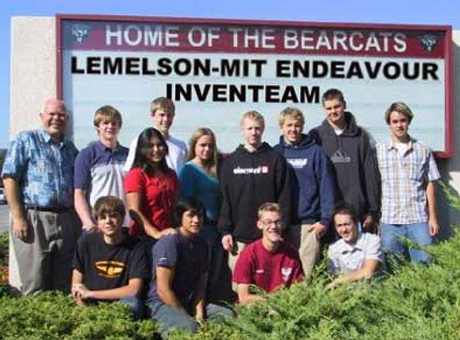Endeavour Academy InvenTeam
Lakes and rivers often contain chemical waste and pollutants that can contaminate the water. This is especially common near factories or facilities with high levels of production. The Endeavor Academy InvenTeam decided to create a device to measure and report the chemical levels in a body of water to aid field researchers and raise awareness about poor water quality. The invention AWQUARiuS stands for Autonomous Water QUAlity Reporting System. The sensors assess acidity (PH), salinity, temperature, flow rate and conductivity, within 1 percent accuracy. It has three BASIC stamps that receive, send and calibrate incoming data. It weighs 20 pounds and is approximately 20 inches tall. The battery for AWQUARiuS is sealed lead acid, 12 Volts, 4 Amps per hour and rechargeable; it can run on battery power for 15 hours. It also features a 21-watt solar panel, with a 16.5 maximum voltage rating, 1.27 AMP maximum, 2 kilowatt/meter production, and cells rated at 25 degrees Celsius. The sensors pick up the data and send it to EEPROM, the memory component, for storage. The contents of the data file in EEPROM are sent to the data analysis component. The integration component receives confirmation that the data was received, which resets the EEPROM counter. Incoming data appears on the LCD to show the transfer, and the data is transmitted to a base station where it can be analyzed and distributed. The Endeavor Academy InvenTeam took a class to learn about microprocessor construction and machine code. Then the students split into four groups to work on the various components of the invention: sensors, system integration and control, enclosure and power, and data and communication analysis. Next, the students began experimenting with the RF transmitter and receiver and the solar panels. The students had to research hardware necessary for the communication part of their project. They tried using a wireless cell phone network to transport the data, which did not work. The team created a test bed as a prototype for its invention, using several BASIC programming stamps. The students received advice and support from Althouse and Meade, a water quality agency; Zurn-Wilkins, a manufacturer of water valves; and Scientific Drilling, a company that controls oil drilling procedures. They received additional monetary support from Mid-State Bank, Zurn-Wilkins, Paso Robles Rotary Clubmembers, and families of the students. The team also sold Krispy Kreme doughnuts to fundraise.


